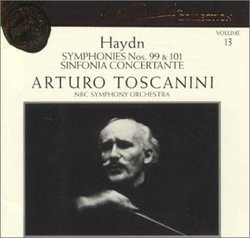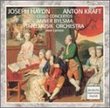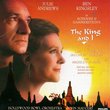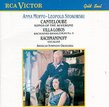| All Artists: Haydn, Toscanini, NBC Title: Joseph Haydn: Symphony No. 101/Symphony No. 99/Sinfonia Concertante, Op. 84 Members Wishing: 0 Total Copies: 0 Label: RCA Release Date: 5/12/1992 Genre: Classical Styles: Historical Periods, Classical (c.1770-1830), Symphonies Number of Discs: 1 SwapaCD Credits: 1 UPC: 090266028221 |
Search - Haydn, Toscanini, NBC :: Joseph Haydn: Symphony No. 101/Symphony No. 99/Sinfonia Concertante, Op. 84
 | Haydn, Toscanini, NBC Joseph Haydn: Symphony No. 101/Symphony No. 99/Sinfonia Concertante, Op. 84 Genre: Classical
|
Larger Image |
CD DetailsSimilarly Requested CDs
|
CD ReviewsSuperlative Historic Performances of Favorite Haydn Works 11/01/1998 (4 out of 5 stars) "Arturo Toscanini was considered by critics to be a "Haydn man" rather than a true, idiomatic Mozartean. "Mozart is sometimes too perfect," the conductor was quoted as having said. Haydn's rustic good humor was more to the Maestro's liking, and this collection of some of his broadcasts, and a commercial recording of the mid-forties, will please anyone who likes Haydn lean and clean (except, perhaps, audiophiles who insist on modern stereo and digital sound mastering.)The Symphony No. 99 in Eb is one of the least known of the "Salomon" series. The finale is full of Haydn's typical humor, having a joke that critic Robert C. Marsh once described as "a fancy fooler for sure." I have never been able to get that bit of alliteration out of my head when enjoying this performance, a fine one in sound quality that is vastly better technologically than the earlier, more expressive one from 1942 that is given the nod by Toscanini historians.The famous "Clock" Symphony (No. 101 in D) was given two Toscanini recordings: a 1929 waxing with the New York Philharmonic in rather dim, antique sound, and this clearer but acoustically dry recording taken down in several sessions during November of 1946 and June of '47, using a small studio (3-A) that had even harsher tone quality than Toscanini's Studio 8-H (which is "dead" by modern standards, lacking resonance.) So, many audiophiles who nevertheless enjoy Toscanini's old records find this reading rather cold and hard, due in part to the uningratiating sonic quality. Toscanini does indeed press forward rather inexorably in many passages, though his characterisation of the delectable "clock" movement is vivid and magical.The NBC broadcast of March 16, 1948 provides a much warmer sonic experience: the Sinfonia Concertante in B-Flat for violin, cello, oboe, and bassoon (a rarity at the time), featuring the superb first-desk players of the orchestra, and a conducting style that is both bracing and nuanced (though lacking in the ultimate sense of relaxation of a great 1939 performance by the Maestro.) The technical quality leaves little to be desired, and this CD release is better than the 1967 LP transfer from RCA Victor."
|

 Track Listings (11) - Disc #1
Track Listings (11) - Disc #1


